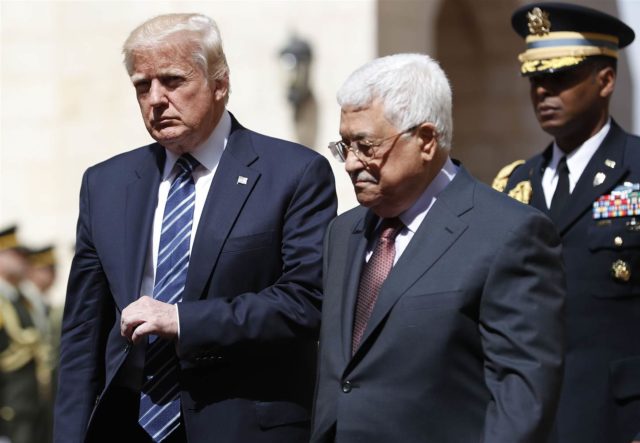It’s starting to sound like a plan.
Since the beginning of the Oslo “peace process,” it has been assumed that Israel has more to give than the Palestinians. After all, the story went, Israel is wealthy, recognized, democratic, and stable. The Palestinians are refugees with nothing. Right? So Israel was told not to build houses for Jews in areas that might become a Palestinian state — lest the Palestinians end up with a country that has Jews in it. Israel has, further, been pressed to “make life better” for the Palestinians in terms of jobs, electricity, water, medical care, and agriculture. The Arab states and the EU — as well as the U.S. — provide funds for, well, for everything including Palestinian leaders’ mansions and bank accounts. The deeper others waded into the “process” over the past two-plus decades, the more the Palestinians could be excused for believing that they didn’t have to do anything, but could wait for people to squeeze more out of Israel on their behalf under threat of a) discontinuing the process and/or b) more violence.
After all, they reasoned, what did they have to lose?
The Trump administration, however, appears to have concluded that the process might work differently if the Palestinians thought they did have something to lose. And by the moaning and shrieking emanating from Ramallah, if that is the plan it may be a good one.
The President started with a clear statement to Palestinian strongman Mahmoud Abbas about not teaching hatred, and then castigating him when he discovered that Abbas’s reassurances were lies. Congress added in the Taylor Force Act, which the President has said he would sign. The bill cuts funds to the Palestinian Authority (PA) as long as the PA is funding salaries for terrorists. Then the administration publicly considered closing the Palestinian mission in Washington because the PA was not meeting its Oslo obligation to negotiate issues directly with Israel and had, instead, made overtures in the International Criminal Court.
And now it appears the administration has failed to sign the waiver that keeps the American embassy in Tel Aviv, rather than moving it to Jerusalem as the law demands. (This one is tricky — the waiver was not signed six months after the previous waiver. Whether the signature has to be precisely six months to the day or has wiggle room is the subject of some discussion.) At the same time, the administration seems ready to declare its recognition of Jerusalem as the capital of Israel, putting Israel on the same footing as 192 other countries in the world who determine their own seats of government.
Reuters reports that President Trump has spoken with both King Abdullah II of Jordan and Palestinian strongman Mahmoud Abbas about his decision to move the embassy.
What the Palestinians have to lose, then, is American acquiescence to a process by which the Palestinians continue gain something for nothing, and in which they believe violence is always their trump card (so to speak). Indeed, Mahmoud Habash, an advisor to Abbas, said that if President Trump were to recognize Jerusalem, it would amount to a “complete destruction of the peace process.” Habash said that “the world will pay the price” for any change in Jerusalem’s status.
Threatening the American administration doesn’t seem like a game-winner. Threatening to destroy the nonexistent “peace process” is spurious.
The Palestinians — and most of the Arab world, save for Egypt and Jordan — have declined every opportunity and every demand for “termination of all claims or states of belligerency and respect for and acknowledgment of the sovereignty, territorial integrity and political independence of every State in the area and their right to live in peace within secure and recognized boundaries free from threats or acts of force.” This is the promise of UN Resolution 242 to Israel after the Arabs had tried in 1967 to reverse the establishment of the State of Israel.
Anwar Sadat and King Hussein offered Israel the terms of UN Resolution 242 and negotiated the terms of peace treaties that served their interests as well as Israel’s. Today, most of the Arab states today are fairly certain Israel is here to stay, but have done no better than put forward an “Arab Peace Plan” that fails Res. 242 entirely. (The so-called “Arab Peace Plan” didn’t come close — requiring that Israel retreat to insecure and unrecognized armistice lines before the Arabs considered recognition of Israel’s legitimacy.)
The U.S. can clearly state the way forward for the Palestinians — they have to make a down payment on peace with Israel. A clear and demonstrable commitment to UN Resolution 242 — to the legitimacy and permanence of Israel in the region — is the price of continued American support. If that is too big a leap, let the Palestinians urge the Arab states to go first so they have support for their move.
If the Palestinians and the Arab states can’t get there, they will have sabotaged themselves and their people (again) far more than Israel or the United States. Israel will continue to be what it is — wealthy, recognized, democratic, and stable. It will continue to create alliances and relationships that benefit its people and its friends. It will continue to make progress in education, technology, security, the arts and the sciences, and it will continue to share those capabilities around the world.
And the United States will stand with its friend and ally, Israel.






